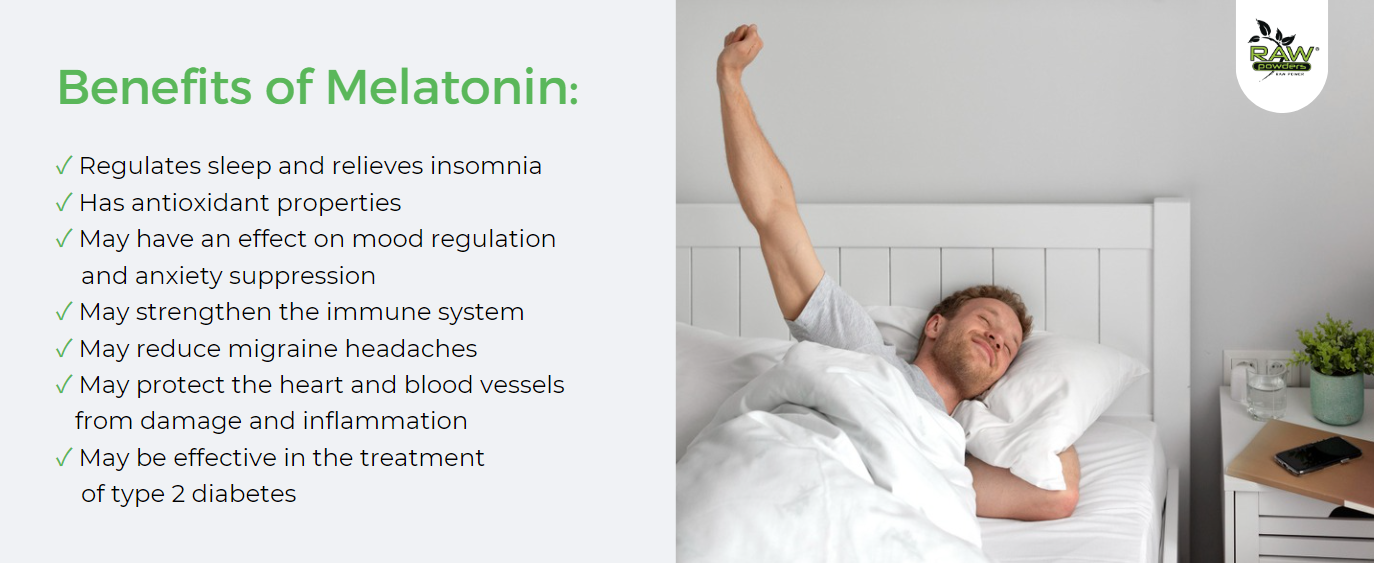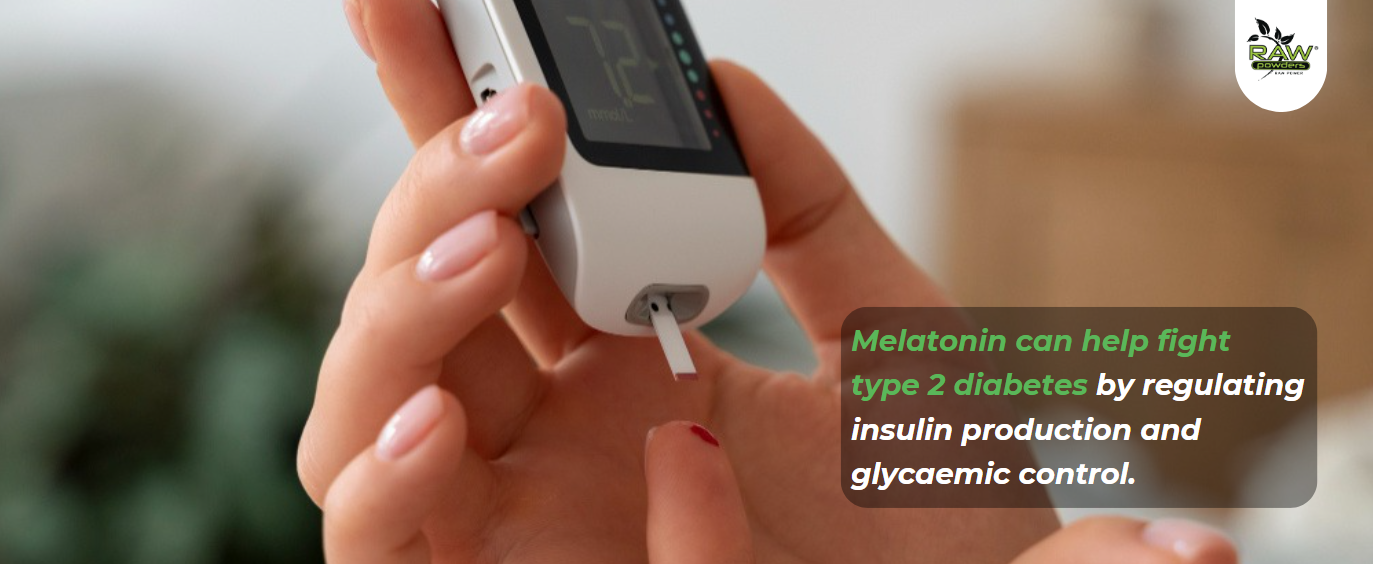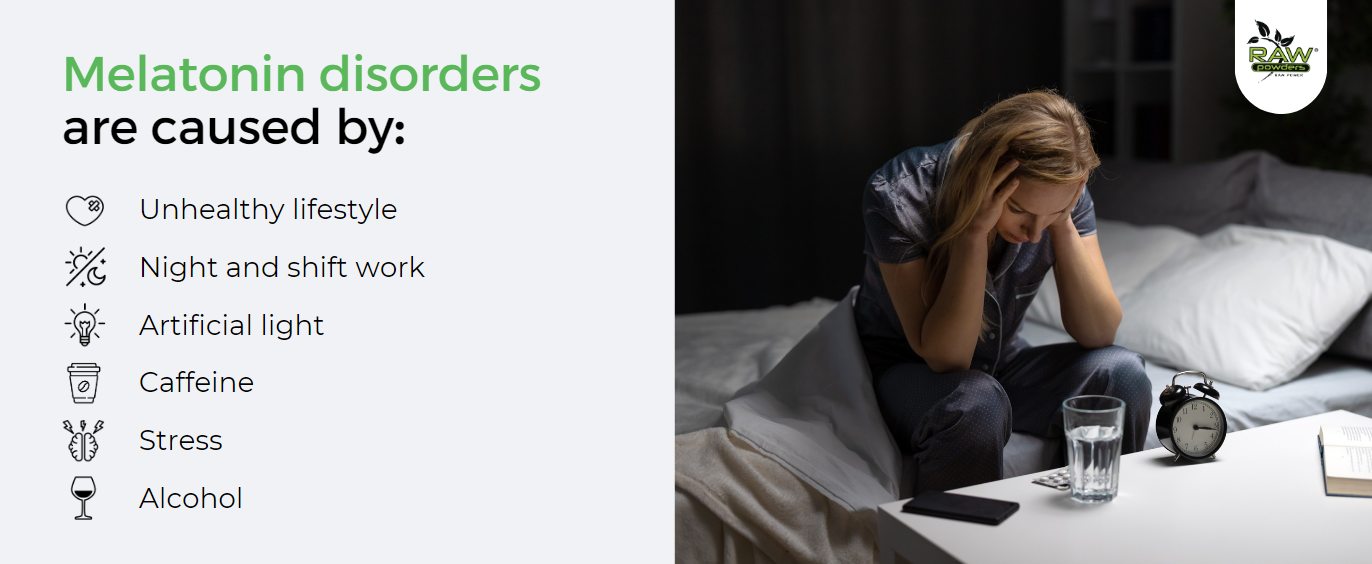WHAT ARE THE HEALTH BENEFITS OF MELATONIN?

Melatonin is a powerful natural hormone that has a wide range of beneficial effects on human health, from sleep regulation to immune system boosting [1, 2] . Scientists are conducting research on the efficacy of melatonin in cases of cancer and diabete [3, 4]. However, although melatonin is important for our health, its supplements should be used with caution, with a conscious approach and ideally under the supervision of a doctor due to possible side effects and interactions with other drugs.
The sleep hormone melatonin regulates our sleep-wake rhythm and is naturally produced in the human body. You can read more about what melatonin is here.
As a dietary supplement, it is considered a panacea for better sleep, which is why people use melatonin to relieve sleep disorders [1, 2]. However, this is not the only function of melatonin, melatonin supplements can help with certain conditions such as jet lag, delayed sleep-wake phase disorder, some sleep disorders in children, and anxiety before and after surgery [5, 6, 7, 8].
Melatonin has been effectively used to combat oxidative stress, inflammation and cellular apoptosis and to restore tissue function in a number of human trials; its efficacy supports its more extensive use in a wider variety of human studies. The uncommonly high-safety profile of melatonin also bolsters this conclusion [4, 9].
In addition to its steadfastness in resisting oxidative stress, melatonin has a very wide number of essential molecular mechanisms. Because of its highly divergent manifested actions, since its discovery almost six decades ago, melatonin has been designated as a regulator of regulators, a refiner of physiology, a tranquilizing agent, a multitasking molecule, nature's most versatile signal, etc. Recently, it was even classified as a biological Higgs boson, a phrase that may actually best characterize this ingenious agent [10].

Beneficial Effects of Melatonin
Melatonin is a hormone produced by the pineal gland, a structure in the brain, and it is essential for the regulation of normal human biological rhythms and sleep. The health benefits of melatonin are diverse and include:
1. Sleep regulation.
Melatonin is an important hormone that regulates sleep-wake cycles. It helps the body to adjust to the rhythms of day and night, facilitating healthy sleep.
- One meta-analysis (analysis of nineteen studies involving 1683 subjects) demonstrates that melatonin decreases sleep onset latency, increases total sleep time and improves overall sleep quality. The effects of melatonin on sleep are modest but do not appear to dissipate with continued melatonin use. Although the absolute benefit of melatonin compared to placebo is smaller than other pharmacological treatments for insomnia, melatonin may have a role in the treatment of insomnia given its relatively benign side-effect profile compared to these agents [11].
- In accordance with new (2022) meta-analysis that includes 23 randomized clinical trials, it was found that the treatment with exogenous melatonin has positive effects on sleep quality, as assessed by the Pittsburgh Sleep Quality Index (PSQI), in adults with respiratory diseases, metabolic disorders, primary sleep disorders, not with mental disorders, neurodegenerative diseases and other diseases [12].
- In accordance with a Review from the Cochrane library, Melatonin is remarkably effective in preventing or reducing jet-lag, and occasional short-term use appears to be safe. It should be recommended to adult travelers flying across five or more time zones, particularly in an easterly direction, and especially if they have experienced jet-lag on previous journeys. Travelers crossing 2-4 time zones can also use it if need be [13].

2. Antioxidant Properties.
Melatonin acts as an antioxidant that can protect the body's cells from oxidative damage. In accordance with several studies melatonin possibly may reduce inflammation and the risk of chronic diseases such as cancer, heart disease and Alzheimer's disease.
Oxidative stress plays a key role in the pathogenesis of aging and many metabolic diseases; therefore, an effective antioxidant therapy would be of great importance in these circumstances. Nutritional, environmental, and chemical factors can induce the overproduction of the superoxide anion radical in both the cytosol and mitochondria. This is the first and key event that leads to the activation of pathways involved in the development of several metabolic diseases that are related to oxidative stress. As oxidation of essential molecules continues, it turns to nitro-oxidative stress because of the involvement of nitric oxide in pathogenic processes. Once peroxynitrite forms, it damages via two distinctive mechanisms. First, it has direct toxic effects leading to lipid peroxidation, protein oxidation, and DNA damage. This mechanism involves the induction of several transcription factors leading to cytokine-induced chronic inflammation. Secondly, the action mechanism of peroxynitrite is indirect. It converts classic antioxidants (vitamins A, C, E) into their inactive forms - quinones. As a result, antioxidants lose their effectiveness.
- According to one review, Melatonin is a multifunctional indolamine that counteracts virtually all pathophysiologic steps and displays significant beneficial actions against peroxynitrite-induced cellular toxicity. This protection is related to melatonin’s antioxidative and antiinflammatory properties. Melatonin has the capability of scavenging both oxygen- and nitrogen-based reactants, including those formed from peroxynitrite, and blocking transcriptional factors, which induce proinflammatory cytokines and is worthy of use in corresponded clinical trials [14].
3. Regulation of mood and behavior.
Melatonin possibly may affect the symptoms of certain mental disorders such as depression and affective disorders.
- For example, one scientific review informs that as a rhythm-regulating factor, the study of melatonin in various depressive illnesses has gained attention. Melatonin can be both a 'state marker' and a 'trait marker' of mood disorders. Measurements of melatonin either in saliva or plasma, or of its main metabolite 6-sulfatoxymelatonin in urine, have documented significant alterations in melatonin secretion in depressive patients during the acute phase of illness. Not only the levels but also the timing of melatonin secretion is altered in bipolar affective disorder and in patients with seasonal affective disorder (SAD). A phase delay of melatonin secretion takes place in SAD, as well as changes in the onset, duration and offset of melatonin secretion. Bright light treatment, that suppresses melatonin production, is effective in treating bipolar affective disorder and SAD, winter type [15].
4. Strengthening the immune system.
Some studies suggest that melatonin may strengthen the immune system, which is responsible for protecting the body against infections, diseases and health problems [16, 17].
- Melatonin is involved with multiple activities that include mitochondrial homeostasis, genomic regulation, modulation of inflammatory and immune cytokines, directly impacting both systemic and acute anti-inflammatory properties as well as indications around its potential role in phase separation. Studies report that melatonin has significant abilities to block pro-inflammatory processes acting on cyclooxygenase (COX-2) and enhance programmed cell death (apoptosis) in aberrant cells, which would theoretically make it a desirable therapeutic in diseases of aging (“inflammaging”), such as cancer. Melatonin’s dual actions can inhibit pro-oxidative enzymes (e.g., xanthine oxidase) while also acting to potentiate the critical antioxidant enzymes such as superoxide dismutase (SOD), glutathione peroxidase, and catalase, aiding in the body’s first line of immune defense and metabolic detoxification [18, 19, 20].
- Also depleted gut melatonin may be involved in migraine occurrence because of the relative increase in N-acetylserotonin to melatonin ratios, resulting in hyperactive glutamatergic excitatory transmission in migraines. Migraines can also be correlated with many autoimmune disorders tied to melatonin regulation failure [21].
- Promising, emerging research indicates that melatonin supplementation may have therapeutic benefits for several autoimmune conditions,most likely due to its mentioned above involvement in anti-inflammatory mechanisms and oxidative stress reduction. Currently, there is an ongoing scientific discussion regarding the use of melatonin with its ability to impact mechanisms that modify immune regulation for COVID-19 [21].
- Based on these findings, further studies must be done to evaluate the efficacy of melatonin as a preventative treatment, however initial results are encouraging. Although scientific evidence is not definitive, there are some initial indications that melatonin could be beneficial and is also considered to be safe [22].
5. Reduces migraines.
Melatonin can reduce migraine pain and its duration, which may be beneficial for persistent migraine sufferers. Melatonin is very likely to be a promising alternative for migraine prophylaxis.
- In all, 7 eligible articles were identified, including 4 randomized controlled studies and 3 observational studies. Due to high heterogeneities and limited number of studies, meta-analysis was not feasible, and only systematic review was performed. The results show that present evidence cannot claim melatonin's effectiveness according to the conflicting outcomes; however, the two negative outcomes of melatonin not different from placebo and melatonin inferior to amitriptyline are possible under-powering because of methodological, pharmacological, and therapeutic shortcomings. Observational studies also support melatonin's efficacy in migraine. As a result, melatonin is very likely to benefit migraine in prophylaxis and may have a similar effectiveness to other main preventive medications. Immediate-release melatonin 3 mg was established as effective, melatonin receptor agonist (Agomelatine) 25 mg and prolonged-release melatonin 4 mg were observed efficacious in observational studies. Melatonin displayed ineffective in the 2-month trial; thus, 3 months or more may be an enough duration for migraine therapy. Despite melatonin being generally safe, emerging literature is illustrating that a few severe adverse effects can be caused by melatonin, for example, liver injuries, reproductive system dysfunctions, and detrimental immunostimulation [23].
6. Cancer prevention and melatonin.
Some studies suggest that melatonin may be useful in the treatment and prevention of cancer due to its antioxidant properties and ability to act as an immunomodulator.
- The anticancer activity of melatonin has been reported in many experimental and clinical studies. The inhibitory effects of this hormone can be achieved as a single therapeutic agent or in combination with other therapies. The involvement of melatonin in activating various anticancer mechanisms in different cancer hallmarks makes this molecule an important physiological anticancer agent. More clinical studies are needed to consider melatonin as a standard therapeutic option to treat some cancers [24].
7. Cardiovascular health.
There is evidence that melatonin may protect the heart and blood vessels from damage and inflammation, and may also reduce high blood pressure and regulate hypertensive disorders.
- Melatonin, the primary circadian hormone, has been substantiated as an effective and safe adjunct anti-hypertensive agent. In support of this, melatonin receptors have been identified within the central and peripheral nervous system, as well as the cardiovascular system, including various vascular tissues. Therefore, it is not surprising that recent research has emerged highlighting a key role of melatonin in autonomic regulation of blood pressure. In animals, pinealectomy elicits peripheral vasoconstriction and hypertension. In studies involving humans, both healthy controls and patient populations of essential and nocturnal hypertension, melatonin administration demonstrates significant hypotensive effects that yield clinically significant results. However, the precise mechanism by which melatonin elicits its hypotensive effects in humans require further investigation [25].
- Substantial evidence supports the importance of endogenous melatonin in cardiovascular health and the benefits of melatonin supplementation in various cardiac pathologies and cardiometabolic disorders. Melatonin plays a crucial role in major pathological processes associated with heart failure including ischemic injury, oxidative stress, apoptosis, and cardiac remodeling. While few clinical studies have investigated the role of melatonin in the context of heart failure, current findings from experimental studies support the potential use of melatonin as preventive and adjunctive curative therapy in heart failure [26].
- According to the conclusion of Meta-analysis (7 trials with 221 participants) add-on controlled-release melatonin to antihypertensive therapy is effective and safe in ameliorating nocturnal hypertension, whereas fast-release melatonin is ineffective. It is necessary that larger trials of longer duration be conducted in order to determine the long-term beneficial effects of controlled-release melatonin in patients with nocturnal hypertension [27].

8. Evaluation of anti-diabetic effects.
Melatonin may also have the potential to treat type 2 diabetes by regulating insulin production and glycaemic control.
- Due to the rapid increase of the global Diabetes mellitus (DM) prevalence, exploring efficient therapies for diabetic complications is an important issue. Routine treatments for DM are generally based on metabolic control, and existing drugs cannot totally control the development of complications. Researchers have recently indicated the capability of melatonin to modulate various signaling pathways and demonstrated its therapeutic and preventive effects in several diseases, such as DM. Preclinical and clinical studies have shown different mechanisms of action of melatonin including reduction of glucose production, and improvement of pro-inflammatory pathways as well as oxidative stress state in DM patients. Previously, it has been revealed that melatonin treatment ameliorates DM through regulating the lipid and glucose metabolism, reducing the insulin resistance and increasing the sensitivity to insulin in experimental models of DM. It will be crucial to perform human clinical trials utilizing combinations of melatonin with current therapeutic agents for treatment and prevention of cardiomyopathy, neuropathy, retinopathy, nephropathy, and other diabetic complications [28].
Although melatonin can have a wide range of health benefits, it is important to take into account that melatonin supplements can cause side effects and interact with certain medications. Therefore, a doctor should be consulted before taking melatonin supplements.

Can melatonin help with insomnia?
People suffering from insomnia may find it difficult to fall asleep, may wake up frequently during their sleep, or both. When symptoms last for a month or more, it is called chronic insomnia.
During the day (or during daylight hours) our body suppresses the release of melatonin, and at dusk the body's production of the sleep hormone melatonin increases sharply. High levels of melatonin cause drowsiness and thus help us to fall asleep faster.
However, sleep-related problems are on the rise: artificial light, night and shift work, unhealthy lifestyles (many hours spent in front of a bright smartphone or computer screen, unhealthy diets, alcohol, caffeine, stress, etc.) all lead to a disruption in the release of melatonin, and the natural levels of the hormone become scarce. The deficiency also occurs as we get older - in children, melatonin levels increase as much as 12 times in the evening, while in adults it increases only 3 times.
Melatonin supplements are a slightly more natural alternative than strong prescription sedatives. However, even supplements should only be used if other natural remedies and methods (e.g. meditation, evening walks, calming tea, etc.) do not help.
Bear in mind that melatonin, if used incorrectly, can cause side effects and further disturb sleep.
In accordance with recommendations of The National Health Service (NHS) (UK) Most adults aged 55 years old or over can take melatonin to help short-term sleep problems. Adults under the age of 55 and children with long-term sleep problems can take melatonin if a specialist recommends it [29] .
To help you fall asleep, you should take a dose recommended by the manufacturer (usually it is about 0.5 - 5 mg) of melatonin in tablet, powder or spray form about 30 minutes before bedtime and always at the same time. We recommend starting with the lowest dose. See here for more information on melatonin dosage and usage recommendations.

Effects of melatonin on headaches, immune system, etc.
This sleep hormone is best known for its effects on sleep disorders, but melatonin has other benefits too.
As mentioned above, melatonin has antioxidant effects. Melatonin's antioxidants fight free radicals, which damage cells in the human body. In this way, melatonin plays a role in maintaining various mechanisms in our body.
In addition, studies have confirmed the benefits of melatonin for headaches and migraines:
- In a randomized, double-blind, placebo-controlled study men and women, aged 18-65 years, with migraine with or without aura, experiencing 2-8 attacks per month, were enrolled. Melatonin (3mg) significantly reduced headache frequency compared with placebo, it was more tolerable than amitriptyline and as effective as amitriptyline 25 mg [30].
- In one more study of 32 patients who treated with melatonin (3 mg, 30 minutes before bedtime), 25 patients (78.1%) had at least a 50% reduction in headache frequency from baseline, eight patients (25%) had no headaches, and none of the patients had increased headaches after three months of therapy. Reduction in frequency was greater than 75% in seven patients (21.8%), and 50% to 75% in 10 patients (31.3%) [31].
- Nevertheless, a new (2022) systematic review states that there are still very few studies on melatonin and migraine with a randomized-controlled trial design available, so there is not enough evidence to support the administration of melatonin as a therapy in migraine sufferers. Further studies are still needed including the safety and side effects of giving melatonin as migraine therapy, especially for a long period of time [32].
What are the benefits of melatonin for depression?
An imbalance of melatonin or sleep deprivation can have devastating consequences for our body's physical and mental health in the long term. Sleep is the basis of a healthy immune system and affects our emotions because melatonin also contributes to the production of the happiness hormone serotonin. The long-term effects of a melatonin deficiency can therefore be extremely painful.
It is also the reason why many people suffer from autumn depression. In dark, gray, rainy weather, melatonin levels in the body increase during the day. We feel tired, indifferent and sad. This is due both to low serotonin production and to high melatonin levels, which increase during the dark hours of the day. So in this way melatonin and depression are 'merged'.
Prolonged and severe sleep disturbances can lead not only to depression, but also to other serious psychosomatic illnesses such as schizophrenic seizures or panic disorders. Depression and mental illness often go hand in hand with difficulty falling asleep and staying asleep.
- In accordance with one review previous studies have shown the therapeutic effects of melatonin, or its important analogue, agomelatine, on depression. It was noted that disrupted circadian rhythm can lead to depressive state, and melatonin via regulating circadian rhythm shows a therapeutic effect. It was also noted that melatonin induces antidepressant effects via promoting antioxidant system and neurogenesis, and suppressing oxidative stress, neuroinflammation, and apoptosis. The interaction effect between melatonin or agomelatine and serotonergic signaling has a significant effect on depression. It was noted that the psychotropic effects of agomelatine are induced by the synergistic interaction between melatonin and 5-HT2C receptors. Agomelatine also interacts with glutamatergic signaling in brain regions involved in regulating mood and circadian rhythm. Interestingly, it was concluded that melatonin exerts both pro- and anti-inflammatory effects, depending on the grade of inflammation. It was suggested that synergistic interaction between melatonin and 5-HT2C receptors may be able to induce therapeutic effects on other psychiatric disorders. Furthermore, the dualistic role of melatonin in regulating inflammation is an important point that can be examined at different levels of inflammation in animal models of depression [33].
Nethertheless further research is needed to recommend melatonin as a possible treatment of depression and mental illness.

Is melatonin suitable for children?
Sleep is a vital element of children’s and adolescents’ overall health; it influences their body and mind and thus affects their quality of life. Adequate sleep quality and duration are essential for maintaining optimal metabolic health and lowering the risk of developing several medical conditions, such as cardiovascular disease.
- One study aimed to assess the perceived sleep quality and duration of 1717 European adolescents from three different European countries (Spain, Iceland and Estonia) aged 13- to 16-years (900 boys, 817 girls) using the Pittsburgh Sleep Quality Index (PSQI). This study found poor sleep quality in 44% of the boys and 53% of the girls, whereas 68% and 69%, respectively did not get the recommended hours of sleep (i.e., 8–10 h) [34].
But is melatonin also available for children? However, melatonin treatment should only be a last resort and, of course, only after first consulting a doctor.
However, we always recommend trying other remedies first. Here are some tips on how children can fall asleep better without medication:
- Get plenty of exercise in the fresh air during the day.
- A healthy diet and regular small portions.
- No sugary or caffeinated drinks such as cola or similar.
- A quiet evening (e.g. reading a book rather than watching TV or playing on the computer).
- A regular bedtime.
- If possible, sleep in a quiet, dark room.
- Listening - if your child is stressed, it is important that they are able to share their fears and worries.
- A shared ritual in the evening (listening to music, talking about the day, bringing the teddy bear to bed).
Highlights
- Sleep Regulator and Insomnia Relief: Melatonin is a key sleep-regulating hormone that is naturally produced in the human brain and regulates sleep-wake cycles, contributing to healthy sleep. Can be useful for preventing or reducing jet-lag. Melatonin can help relieve insomnia by regulating biological rhythms, especially when traditional methods do not work.
- Antioxidant: Melatonin also acts as an antioxidant, protecting cells from oxidative damage, reducing inflammation, and potentially lowering the risk of chronic diseases such as cancer and Alzheimer's disease.
- Mood Regulation and Anxiety Inhibition: In accordance with several studies Melatonin possibly may affect mood and depression symptoms, and may be useful in combating affective disorders.
- Strengthening the Immune System: Melatonin can strengthen the immune system, potentially protecting against infections and disease.
- Headaches and Migraine Relief: According to several studies Melatonin possibly may reduce migraine pain and its duration.
- Cancer Prevention: Melatonin may have a role in cancer treatment and prevention strategies but additional studies are required to be handled to clarify these kinds of findings.
- Cardiovascular Health: There is evidence that melatonin may protect the heart and blood vessels from damage and inflammation and may also lower blood pressure.
- Anti-diabetic Effects: Melatonin may have a positive effect on the treatment of type 2 diabetes.
- Children's Health: Melatonin can be used in some cases to treat sleep disorders in children, but only under medical supervision.
- Side Effects and Interactions: While melatonin may be beneficial, it is important to consider possible side effects and interactions with other medications. Read more about melatonin's possible side effects here.
Medical Disclaimer
The information provided in our articles is solely for educational purposes and should not be considered medical advice or instruction. No action or inaction should be taken based solely on the contents of this information. Readers should consult their health care professional on any matter related to their health and well-being. The information and opinions provided here are believed to be accurate and sound, based on the best judgment available to the authors, but readers who fail to consult with appropriate health authorities assume the risk of any injuries. The publisher is not responsible for errors or omissions.
Please be aware that different countries may have specific regulations and that this disclaimer does not replace the need for consultation with a healthcare provider before beginning or changing a treatment or supplement regimen. The information contained in this article is not intended to diagnose, treat, cure, or prevent any disease. Individual results may vary.
References
- Pereira, N., Naufel, M., Ribeiro, E., Tufik, S., & Hachul, H. (2019). Influence of Dietary Sources of Melatonin on Sleep Quality: A Review.. Journal of food science. doi: 10.1111/1750-3841.14952. https://ift.onlinelibrary.wiley.com/doi/10.1111/1750-3841.14952.
- Reiter, R., Tan, D., Korkmaz, A., & Rosales‐Corral, S. (2014). Melatonin and stable circadian rhythms optimize maternal, placental and fetal physiology.. Human reproduction update, 20 2, 293-307 . doi: 10.1093/humupd/dmt054. https://academic.oup.com/humupd/article/20/2/293/665318.
- Rondanelli, M., Faliva, M., Perna, S., & Antoniello, N. (2013). Update on the role of melatonin in the prevention of cancer tumorigenesis and in the management of cancer correlates, such as sleep-wake and mood disturbances: review and remarks. Aging Clinical and Experimental Research, 25, 499 - 510. doi: 10.1007/s40520-013-0118-6. https://link.springer.com/article/10.1007/s40520-013-0118-6.
- Paula Fernández-Palanca, Carolina Méndez-Blanco, Flavia Fondevila, María J. Tuñón, Russel J. Reiter, José L. Mauriz, Javier González-Gallego. Melatonin as an Antitumor Agent against Liver Cancer: An Updated Systematic Review. Antioxidants (Basel). 2021 Jan; 10(1): 103. Published online 2021 Jan 12. doi: 10.3390/antiox10010103. https://www.ncbi.nlm.nih.gov/pmc/articles/PMC7828223/.
- Chase, J., & Gidal, B. (1997). Melatonin: Therapeutic Use in Sleep Disorders. Annals of Pharmacotherapy, 31, 1218 - 1226. doi: 10.1177/106002809703101015. https://journals.sagepub.com/doi/10.1177/106002809703101015
- MacMahon, K., Broomfield, N., & Espie, C. (2005). A Systematic Review of the Effectiveness of Oral Melatonin for Adults (18 to 65 Years) with Delayed Sleep Phase Syndrome and Adults (18 to 65 Years) with Primary Insomnia. Current Psychiatry Reviews, 1, 103-113. doi: 10.2174/1573400052953556. https://www.eurekaselect.com/article/24807
- Phillips, L., & Appleton, R. (2004). Systematic review of melatonin treatment in children with neurodevelopmental disabilities and sleep impairment.. Developmental medicine and child neurology, 46 11, 771-5 . doi: 10.1017/S001216220400132X. https://pubmed.ncbi.nlm.nih.gov/15540639/
- Andersen, L., Werner, M., Rosenberg, J., & Gögenur, I. (2014). A systematic review of peri‐operative melatonin. Anaesthesia, 69. doi: 10.1111/anae.12717. https://associationofanaesthetists-publications.onlinelibrary.wiley.com/doi/10.1111/anae.12717
- Hamed Haghi-Aminjan, Bagher Farhood, Mahban Rahimifard, Tina Didari, Maryam Baeeri, Shokoufeh Hassani, Rohollah Hosseini, Mohammad Abdollahi. The protective role of melatonin in chemotherapy-induced nephrotoxicity: a systematic review of non-clinical studies. Review Expert Opin Drug Metab Toxicol. 2018 Sep;14(9):937-950. doi: 10.1080/17425255.2018.1513492. https://pubmed.ncbi.nlm.nih.gov/30118646/
- Russel J Reiter, Juan C Mayo, Dun-Xian Tan, Rosa M Sainz, Moises Alatorre-Jimenez, Lilian Qin. Melatonin as an antioxidant: under promises but over delivers. Review: J Pineal Res. 2016 Oct;61(3):253-78. doi: 10.1111/jpi.12360. Epub 2016 Sep 1. PMID: 27500468. https://pubmed.ncbi.nlm.nih.gov/27500468/
- Eduardo Ferracioli-Oda, Ahmad Qawasmi, Michael H Bloch. Meta-analysis: melatonin for the treatment of primary sleep disorders. Meta-Analysis: PLoS One. 2013 May 17;8(5):e63773. doi: 10.1371/journal.pone.0063773. Print 2013. PMID: 23691095 PMCID: PMC3656905. https://pubmed.ncbi.nlm.nih.gov/23691095/.
- Gholami Fatemeh, Moradi Sajjad, Rasaei Niloufar, Soveid Neda, Setayesh Leila, Mirzaei Khadijeh. Effect of melatonin supplementation on sleep quality: a systematic review and meta-analysis of randomized controlled trials. Review: J Neurol. 2022 Jan;269(1):205-216. doi: 10.1007/s00415-020-10381-w. Epub 2021 Jan 8. PMID: 33417003. https://pubmed.ncbi.nlm.nih.gov/33417003/
- A Herxheimer, K J Petrie. Melatonin for the prevention and treatment of jet lag. Review: Cochrane Database Syst Rev. 2002:(2):CD001520. doi: 10.1002/14651858.CD001520. PMID: 12076414. https://pubmed.ncbi.nlm.nih.gov/12076414/
- Ahmet Korkmaz, Russel J Reiter, Turgut Topal, Lucien C Manchester, Sukru Oter, Dun-Xian Tan. Melatonin: an established antioxidant worthy of use in clinical trials. Review: Mol Med. 2009 Jan-Feb;15(1-2):43-50. doi: 10.2119/molmed.2008.00117. Epub 2008 Nov 4. PMID: 19011689 PMCID: PMC2582546. https://pubmed.ncbi.nlm.nih.gov/19011689/
- Venkataramanujan Srinivasan, Marcel Smits, Warren Spence, Alan D Lowe, Leonid Kayumov, Seithikurippu R Pandi-Perumal, Barbara Parry, Daniel P Cardinali. Melatonin in mood disorders. Review: World J Biol Psychiatry. 2006;7(3):138-51. doi: 10.1080/15622970600571822. PMID: 16861139. https://pubmed.ncbi.nlm.nih.gov/16861139/
- Stephen C Bondy, Arezoo Campbell. Melatonin and Regulation of Immune Function: Impact on Numerous Diseases. Review: Curr Aging Sci. 2020;13(2):92-101. doi: 10.2174/1874609813666200711153223. PMID: 32651969. https://pubmed.ncbi.nlm.nih.gov/32651969/
- Juan M Guerrero, Russel J Reiter. Melatonin-immune system relationships. Review: Curr Top Med Chem. 2002 Feb;2(2):167-79. doi: 10.2174/1568026023394335. PMID: 11899099. https://pubmed.ncbi.nlm.nih.gov/11899099/
- Erdemli, H., Akyol, S., Armutcu, F., Gulec, M., Canbal, M., & Akyol, O. (2016). Melatonin and caffeic acid phenethyl ester in the regulation of mitochondrial function and apoptosis: The basis for future medical approaches.. Life sciences, 148, 305-12 . doi: 10.1016/j.lfs.2016.01.026. https://www.sciencedirect.com/science/article/abs/pii/S0024320516300236?via%3Dihub
- Gaia Favero, Lorenzo Franceschetti, Francesca Bonomini, Luigi Fabrizio Rodella, Rita Rezzani. Melatonin as an Anti-Inflammatory Agent Modulating Inflammasome Activation. Int J Endocrinol. 2017; 2017: 1835195. Published online 2017 Oct 1. doi: 10.1155/2017/1835195. https://www.ncbi.nlm.nih.gov/pmc/articles/PMC5643098/
- Diana Maria Chitimus, Mihaela Roxana Popescu, Suzana Elena Voiculescu, Anca Maria Panaitescu, Bogdan Pavel, Leon Zagrean, Ana-Maria Zagrean. Melatonin’s Impact on Antioxidative and Anti-Inflammatory Reprogramming in Homeostasis and Disease. Biomolecules. 2020 Sep; 10(9): 1211. Published online 2020 Aug 20. doi: 10.3390/biom10091211. https://www.ncbi.nlm.nih.gov/pmc/articles/PMC7563541/.
- Samanta, S. (2020). Melatonin: an endogenous miraculous indolamine, fights against cancer progression. Journal of Cancer Research and Clinical Oncology, 146, 1893-1922. doi: 10.1007/s00432-020-03292-w. https://link.springer.com/article/10.1007/s00432-020-03292-w
- Deanna M Minich, Melanie Henning, Catherine Darley, Mona Fahoum, Corey B Schuler, James Frame. Is Melatonin the "Next Vitamin D"?: A Review of Emerging Science, Clinical Uses, Safety, and Dietary Supplements. Review Nutrients. 2022 Sep 22;14(19):3934. doi: 10.3390/nu14193934. PMID: 36235587 PMCID: PMC9571539. https://pubmed.ncbi.nlm.nih.gov/36235587/
- Rujin Long, Yousheng Zhu, and Shusheng Zhou. Therapeutic role of melatonin in migraine prophylaxis. Medicine (Baltimore). 2019 Jan; 98(3): e14099. Published online 2019 Jan 18. doi: 10.1097/MD.0000000000014099. PMCID: PMC6370052 PMID: 30653130. https://www.ncbi.nlm.nih.gov/pmc/articles/PMC6370052/.
- Wamidh H Talib. Melatonin and Cancer Hallmarks. Review: Molecules. 2018 Feb 26;23(3):518. doi: 10.3390/molecules23030518. PMID: 29495398 PMCID: PMC6017729. https://pubmed.ncbi.nlm.nih.gov/29495398/
- Jacquie Baker, Kurt Kimpinski. Role of melatonin in blood pressure regulation: An adjunct anti-hypertensive agent. Review: Clin Exp Pharmacol Physiol. 2018 Aug;45(8):755-766. doi: 10.1111/1440-1681.12942. Epub 2018 May 3. PMID: 29603319. https://pubmed.ncbi.nlm.nih.gov/29603319/
- Frederic Nduhirabandi, Gerald J Maarman. Melatonin in Heart Failure: A Promising Therapeutic Strategy? Review: Molecules. 2018 Jul 22;23(7):1819. doi: 10.3390/molecules23071819. PMID: 30037127 PMCID: PMC6099639. https://pubmed.ncbi.nlm.nih.gov/30037127/
- Ehud Grossman, Moshe Laudon, Nava Zisapel. Effect of melatonin on nocturnal blood pressure: meta-analysis of randomized controlled trials. Review: Vasc Health Risk Manag. 2011:7:577-84. doi: 10.2147/VHRM.S24603. Epub 2011 Sep 15. PMID: 21966222 PMCID: PMC3180511. https://pubmed.ncbi.nlm.nih.gov/21966222/
- Mohammad Hossein Pourhanifeh, Azam Hosseinzadeh, Ehsan Dehdashtian, Karim Hemati, Saeed Mehrzadi. Melatonin: new insights on its therapeutic properties in diabetic complications. Review: Diabetol Metab Syndr. 2020 Apr 8:12:30. doi: 10.1186/s13098-020-00537-z. eCollection 2020. PMID: 32280378 PMCID: PMC7140344. https://pubmed.ncbi.nlm.nih.gov/32280378/
- National Health Service (NHS) of England. Who can and cannot take melatonin. Page last reviewed: 13 February 2023. https://www.nhs.uk/medicines/melatonin/who-can-and-cannot-take-melatonin/.
- Andre Leite Gonçalves, Adriana Martini Ferreira, Reinaldo Teixeira Ribeiro, Eliova Zukerman, José Cipolla-Neto, Mario Fernando Prieto Peres. Randomized clinical trial comparing melatonin 3 mg, amitriptyline 25 mg and placebo for migraine prevention. Randomized Controlled Trial: J Neurol Neurosurg Psychiatry. 2016 Oct;87(10):1127-32. doi: 10.1136/jnnp-2016-313458. Epub 2016 May 10. PMID: 27165014 PMCID: PMC5036209. https://pubmed.ncbi.nlm.nih.gov/27165014/
- M F P Peres, E Zukerman, F da Cunha Tanuri, F R Moreira, J Cipolla-Neto. Melatonin, 3 mg, is effective for migraine prevention. Clinical Trial: Neurology. 2004 Aug 24;63(4):757. doi: 10.1212/01.wnl.0000134653.35587.24. PMID: 15326268. https://pubmed.ncbi.nlm.nih.gov/15326268/.
- I Made Oka Adnyana, Clarissa Tertia, I Putu Eka Widyadharma, Ni Putu Ayu Putri Mahadewi. Melatonin as a treatment for migraine sufferers: a systematic review. The Egyptian Journal of Neurology, Psychiatry and Neurosurgery volume 58, Article number: 94 (2022). Published: 17 August 2022. https://ejnpn.springeropen.com/articles/10.1186/s41983-022-00524-3
- Gita Kholghi, Maliheh Eskandari, Mohammad-Saleh Shokouhi Qare Saadlou, Mohammad-Reza Zarrindast, Salar Vaseghi. Night shift hormone: How does melatonin affect depression? Review Physiol Behav. 2022 Aug 1:252:113835. doi: 10.1016/j.physbeh.2022.113835. Epub 2022 May 2. PMID: 35504318. https://pubmed.ncbi.nlm.nih.gov/35504318/
- Pablo Galan-Lopez, Raúl Domínguez, Thordis Gísladóttir, Antonio J Sánchez-Oliver, Maret Pihu, Francis Ries, Markos Klonizakis. Sleep Quality and Duration in European Adolescents (The Adoles Health Study): A Cross-Sectional, Quantitative Study. Children (Basel). 2021 Mar 3;8(3):188. doi: 10.3390/children8030188. PMID: 33802334 PMCID: PMC7999763. https://pubmed.ncbi.nlm.nih.gov/33802334/




_front%20(1)-250x250.png)


_front%20(1)-250x250.png)

-(NN)_front%20(1)-min-250x250.png)

_front%20(1)-250x250.png)


_front%20(1)-min-250x250.png)
_front%20(1)%20(1)-250x250.png)




_front%20(1)-min-250x250.png)



